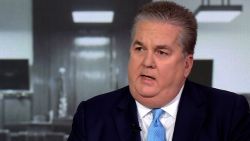Editor’s Note: In this weekly column “Cross-exam,” Elie Honig, a former federal and state prosecutor and CNN legal analyst, gives his take on the latest legal news and answers questions from readers. Post your questions below. The views expressed in this commentary are his own. View more opinion articles on CNN. Watch Honig answer reader questions on “CNN Newsroom” at 5:40 p.m. ET Sundays.
Attorney General William Barr is scheduled to testify Wednesday in the Senate and on Thursday in the House, though CNN reported he is balking at the format on the Democratic-controlled House side and threatening not to appear. (Apparently the threat of follow-up questioning by congressional aides is too much for the nation’s top prosecutor to withstand.) When Barr testifies in Congress this week – even if he boycotts the House and only appears in the Senate – he finally will face a fair fight.

During his nearly monthlong campaign to pre-emptively distort the findings of special counsel Robert Mueller’s report, Barr had a distinct advantage over Congress, the media and the American public: He had seen the report, but virtually nobody else had (except Trump’s lawyers, who got a special sneak peek of the redacted version, courtesy of Barr). But now the whole world has seen the redacted version of Mueller’s report – and Barr’s got nowhere to hide.
Thus far, Barr has given us a disingenuous and inaccurate spin on Mueller’s report. Now it’s time for Barr to get called out publicly on his most important misstatements and his overt political pandering. Here are five key questions Congress should ask the attorney general this week:
1) Mueller details multiple “potentially obstructive” acts by Trump.” Do you believe that none of these actions violated the law? And that all of Trump’s actions cited by Mueller were lawful?
Barr brushes aside Mueller’s entire obstruction investigation with one conclusory sentence in his four-page letter. In Barr’s view, “the evidence developed during the Special Counsel’s investigation is not sufficient to establish that the President committed an obstruction-of-justice offense.” However, it is difficult to justify Barr’s sweeping no-obstruction conclusion when examined against each of the specific instances of potential obstruction described in detail by Mueller.
For at least four of the “potentially obstructive” acts – Trump’s effort to fire Mueller, Trump’s effort to restrict Mueller’s investigation, Trump’s effort to have then-White House counsel Don McGahn lie about Trump’s effort to fire Mueller and Trump’s effort to dissuade ex-campaign chairman Paul Manafort from cooperating – Mueller finds “substantial evidence” of all the legal elements required to charge and convict on obstruction. And Mueller explains his decision not to subpoena Trump in part because “based on the significant body of evidence we had already obtained of the President’s actions … we had sufficient evidence to understand relevant events and to make certain assessments without the President’s testimony.” Meaning: We already had enough evidence of the President’s intent to obstruct, so we didn’t even need to subpoena him.
In my experience as a prosecutor, I’d have gone to a grand jury without hesitation to indict based on Mueller’s evidence. Mueller lays out a simply overwhelming case for obstruction. Barr now must fight an uphill battle to justify his “no obstruction” conclusion against the incriminating facts laid out methodically in Mueller’s report.
2) You stated that Mueller’s decision not to make a prosecutorial decision on obstruction “leaves it to” you, as attorney general, to decide. Where in the report does Mueller “leave it to” the attorney general? When discussing obstruction, doesn’t Mueller repeatedly invoke Congress and its power to bring impeachment proceedings?
Barr likely will respond that, as attorney general, it is his prerogative to decide whether to charge any federal case. That conclusion, however, is at odds with the special counsel regulations, which give the power to make “prosecution or declination decisions” to the special counsel, not the attorney general. And by stepping in and making a decision, Barr contravened the fundamental purpose of the special counsel – to take sensitive decision-making, potentially affecting the President, out of the hands of an attorney general who was appointed by and works at the pleasure of the very person who is under investigation.
In fact, Mueller stops just short of explicitly calling on Congress to impeach, though he comes mighty close: “(T)he conclusion that Congress may apply the obstruction laws to the President’s corrupt exercise of the powers of office accords with our constitutional system of checks and balances and accords with the principle that no person is above the law.”
In the report, Mueller repeatedly cites Justice Department policy against indicting a sitting president as a major reason for not reaching a traditional prosecutorial judgment on obstruction (contrary to Barr’s statement that Mueller did not rely on the policy). Given that policy, there is only one entity capable of taking action to remedy wrongful conduct by a sitting president: Congress.
3) As the nation’s top law enforcement officer, does it raise national security concerns that the Trump campaign knew about, failed to report and expected to benefit from election-related crimes by Russia? What steps have you taken to prevent this from happening again in 2020?
In his four-page letter, Barr quoted Mueller’s conclusion that “the investigation did not establish that members of the Trump Campaign conspired or coordinated with the Russian government in its election interference activities.” But Barr intentionally cut off the first half of that same sentence, finding that (1) the Russian government tried to help Trump win the election, and (2) the Trump campaign “expected it would benefit electorally from information stolen and released through Russian efforts.”
This misleading, selective quoting by Barr betrays his underlying political bias toward Trump. It also raises a question about whether Barr truly understands and intends to do anything about the security risk raised by the possibility of another Russian hack in the 2020 election – particularly given the Trump campaign’s demonstrated eagerness to benefit from such criminal conduct in 2016.
4) You stated that “the White House fully cooperated with the special counsel’s investigation,” yet Mueller wrote that Trump’s written answers were “insufficien(t)” and “inadequate” – and that Trump campaign personnel “deleted relevant communications,” leaving Mueller with “identified gaps” in his investigation. Do you stand by your position that Trump fully cooperated?
Barr’s got little wiggle room here. He gratuitously praised Trump and the White House for fully cooperating, yet the facts found by Mueller plainly show otherwise. Mueller noted that Trump gave unacceptable answers and that Trump campaign staffers deleted evidence, leaving gaps in the investigation. That’s not full cooperation; that’s evidence of obstruction.
5) Given that words such as “collusion” and “spying” have no legal significance – but are loaded political buzzwords routinely invoked by Trump to rally his political base – why did you, as attorney general, repeatedly use them?
During his press conference shortly before the release of the Mueller report, Barr repeatedly invoked Trump’s favorite defensive catchphrase: “no collusion.” And during his prior congressional testimony, Barr stated that “I think spying did occur,” parroting another favorite Trump theory.
No serious prosecutor would use either of those terms because they have no meaning in criminal law. As Mueller notes in the report: “(C)ollusion is not a specific offense or theory of liability found in the United States Code, nor is it a term of art in federal criminal law.” Barr, however, used both of these politically loaded, nonlegal terms repeatedly, exposing his political bias. If there is some legitimate reason why he used such terms, Barr needs to provide it under oath.
Mueller’s report is out, and the contrast is apparent between Barr’s description and the report itself. Now Barr will have to answer publicly for his campaign to distort Mueller’s findings, mislead the public and protect Trump.























